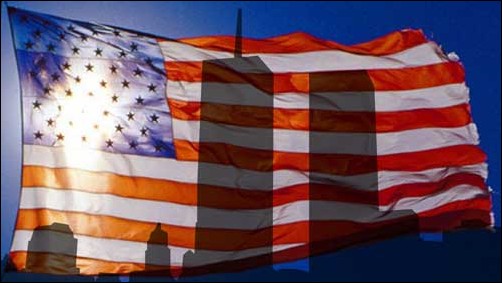Students still suffering discrimination a year after 9/11

Image: Students still suffering discrimination a year after 9/11:Photo illustration by Cody Frost:
September 11, 2002
Upon arriving at school last Sept. 11, Omar Mumtaz, a sophomore computer engineering major from Pakistan, watched the events unfold on TV at the Riverfront Market amidst a crowd of students.
“It was so tragic and shocking,” he said. “I couldn’t believe it for a few days.”
Mumtaz called his family in Pakistan to assure them that everything was OK.
-“Some of my other friends? families were more worried, and said to them, ?if things go bad, just come home.?”
For Besma Marmosh, a junior communications student, Sept. 11 was a flashback of the Oklahoma City bombing, when a Muslim terrorist was first accused of the crime.-
-Marmosh was at the mall when the news about the Oklahoma bombing hit six years earlier in April 1995.
-“Someone yelled, ?Go back home.? I called my dad and asked him what happened, and he said, ?Stay there. I?m coming to pick you up.?”-
-“Everyone started accusing Muslims, and they had this idea of how he looked like,” Marmosh said. –
-When Marmosh first heard about the Sept. 11 attacks, she feared that “the stereotypes about Muslims, Arabs, and anyone who looks Middle Eastern would (resurface).”–
-That day was the start of a cycle of tension and fear for Arab Muslim students, who experienced a backlash of discrimination for their beliefs and their heritage when Middle Eastern terrorist groups were linked to the attacks.-
-Mumtaz knew some international students from Sacramento State who were visited and interrogated by the FBI, one of which had just come to Sac State last spring.
-“They gave him a call and set up a time to ask him questions,” Mumtaz said. On that day, three FBI cars showed up in front of his house. “They asked him how he came here, what he was studying, or how he could help them in any way. Then they gave him their business card.”
-Amin Saleh, the president of the Muslim Student Association, feared for his family when his mom and sister both experienced cases of road rage right after the attacks.
– “My mom was driving and a guy leaned out his window and threw a cigar at her. My sister was run off the road by a guy in a big rig.” Both his mother and sister were unharmed.
-The Sac State campus itself wasn?t a safe haven from prejudice against Muslim students, either. Marmosh, who wears a hijab, the traditional veil worn by Muslim women, felt some tension from students who would stare at her. –
-“They weren?t sure what to think of me. That?s the feeling I was getting from them,” Marmosh said. Marmosh?s concerned family took precautions for her safety shortly after the attacks.-
-“They told me to go to classes and then come home, so things wouldn?t happen,” she said. “I personally wasn?t afraid, and I had faith in the school and students around me. I wasn?t fearful, but others were.”-
-Saleh believes that the media sends out mixed messages and portrayals of Islam, which leads to stereotypes and prejudices against Muslim people. –
-“The President comes out and says that Muslims are good and didn?t do this. But on CNN, they?ll ask, ?Is Islam a terrorist religion?? or ?What part of Islam condones this behavior?? They won?t show Osama bin Laden, but you?ll see images of Muslims praying.” The media also “injects a certain image about Muslims,” Marmosh said.-
-“The media makes it clear when a terrorist is Muslim or a ?Muslim fundamentalist.? These terms are used so commonly,” she said. The biggest misconception that most Americans have about Islam, Marmosh said, is that Islam is directly linked to terrorism.
-“That?s completely wrong. There are people who are extremists, that take things from their culture and mix it with religion,” Marmosh said.
-Like Christianity or Judaism, Islam crosses racial and cultural lines. Different cultures have different takes on the teachings of the Koran, Islam?s holy writings. Some see it as a call to peace and others a call to violence.-
-“There is nowhere in the Koran that says it?s OK to kill innocents,” said Kadafi Mohamed, a Muslim from Vietnam. “Even if the people who did this are ?Muslim,? they?re not real Muslims.”















































































































































